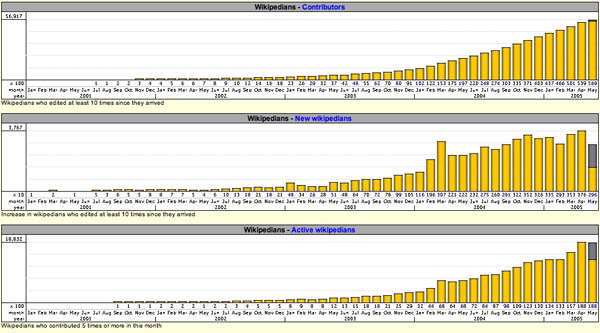
From weblogg-ed (via Library Stuff):
- Over 4,000 new articles a day.
- An average of 14 edits per entry.
- About 57,000 people who have edited at least 10 times.
- About 2.7 million edits in May
It’s hard to deny that something is going on here. I wonder, though… Insofar as it assumes the mantle of the print encyclopedia, Wikipedia represents a migration of print-based knowledge to the web. Many of its most devoted contributors acquired their learning from a print world of libraries, books and periodicals. But what happens later, after this formative period, when your average user is someone who derives the bulk of their learning from the web (from resources like Wikipedia)? How do you maintain the Wikipedia article on the Spanish Golden Age when that same article is your primary source?
Perhaps Wikipedia’s encyclopedia-ness is just an early skin that it will eventually shed. It may well devolve into a sprawling compendium of trivia and eccentric niche outposts (in some ways, that’s what it already is). Or it may evolve further into that strange hybrid animal: a reference work on current events (as it has proven itself to be with the new pope and the London bombings). On the other hand, if serious scholars decide that Wikipedia is a legitimate resource worthy of investment, we might see it sustain itself as a reliable reference work (without, of course, losing all the trivia and current events). To do this, it might, paradoxically, need to stay grounded in the offline world.
